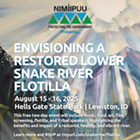In a world of sound bites, it's refreshing to open a newspaper and read the thoughtful commentaries of Leonard Pitts Jr., whose syndicated column provides passionate but sound meditations on pop culture, family life and social issues. His mindful, articulate essays are based on compassionate thinking rather than the emphatic self-righteousness of many columnists.
Maybe Pitts' writing remains humble because he never intended to have such a decisive voice. Pitts began publishing music reviews and profiles at the age of 18 and went on to write for radio shows, most notably for the popular Weekly Top 40 program with Casey Kasem. He switched from radio to print journalism in 1991, after joining the Miami Herald as its pop music critic. Pitts started his column 10 years ago and has, during the past decade, been a temperate yet persistent critic of American pop culture.
Since 9/11, Pitts' columns have joined the political with the personal, asking readers to closely examine what it means to be American and challenging people to find productive and sensitive ways to engage in debate; his commentary "We'll Go Forward From This Moment," an emotional response to the terrorist attacks, generated 30,000 response e-mails, circulated around the world and was published in papers across the globe. Pitts won the 2004 Pulitzer Prize for commentary after having been a finalist in '93. Pitts' book, Becoming Dad: Black Men and the Journey to Fatherhood, was a bestseller. He lives in Miami with his wife and five children.
Pitts will be in Spokane next week, speaking at a luncheon at the Spokane City Forum, at Gonzaga University and at a fundraising event for the Martin Luther King Jr. Center. Here Pitts talks about the nation's great divide.
Inlander: When I heard you were coming to speak about pop culture and family life, I thought it would be timely it because we are faced with the realization of what a divided nation we are. Does pop culture play a role in that division?
Leonard Pitts: I think the difference in how pop culture is perceived speaks to how divided we are. I don't know that pop culture divides the nation; it is a reflection of who we are, but it does not drive who we are. It's a chicken/egg argument. They [entertainment producers] wouldn't put out edgy, or what some may think lewd and crude [products] if they don't think it will resonate. And this tells us who we are as people, as mothers and fathers.
There could not have been an Eminem in '74 and '75. We would have laughed this guy out of town because there was nothing he was saying that would be valuable to us. But now maybe what we'd say would be laughed out of town. The existence of a Nelly speaks about who we are as a nation.
Pop culture has become increasingly political. Even Eminem recently released a music video filled with Bush-bashing. This election really demonstrated the political segregation in our country. And what's interesting is that the issues we're split over are mostly moral ones, which has everything to do with the pulse of pop culture. We don't even agree on what America is about, what it stands for. Is this simply an inevitable part of any working democracy, or have we hit a major stumbling block here?
It's a product of democracy more than a stumbling block, but at the same time the fact that we're so divided doesn't bode well for finding common ground. It's something I've written about at length in recent columns, and as an American I'm concerned about the future of this country. If we have a common set of facts we agree on, we can interpret those and start from there. Now there is not even a common fact. People can't even agree on the basics. It's less likely people [will] compromise.
After 9/11, we were together as a nation -- even, really, with the whole world. We were all in mourning; we were all going through a very emotional process. The country really galvanized and there was this amazing surge of support for one another. What happened? How, just a few years later, could we have come to this? People are flipping each other off when they see opposing political viewpoints on bumper stickers. They can't talk to each other. This can't be healthy for communities.
George Bush happened. And the war in Iraq happened. In a larger sense, you cannot lay it totally there. I gave a speech after the attack in which I pointed out when someone is trying to kill you, you will hug and cling to the nearest person who is not trying to kill you. That's what the [post-9/11] unity was about. We were scared. There was not time to be concerned with race, religions, gender. As the fear of that fades, we find ourselves mired in war -- [a war] that some of us didn't [support] from the beginning. What would be interesting is if there was another 9/11. What would happen? We've been yanked to and fro over the last few years. Would we be pulled back together? Frankly I don't know, because the anger and acrimony are so deep. This is not like any other election in my memory. It's not like, 'I disagree with this guy and his policies.' It's a profound fear and dislike for one another.
What problems does all this pose for American communities and families?
I think it means we're coming into a challenging and troubling time. I don't know how we're going to put Humpty Dumpty back together again. The rhetoric has gone so far to the left and to the right, there is no common ground. I don't like extremism, even if it agrees with me. Once you've given yourself permission to be extreme, then you've given yourself permission to stop listening to others. You've got the one and only truth. That's the Al Qaeda reasoning, that's the Eric Rudolph -- who blew up abortion clinics and [set off] a bomb during the Atlanta Olympics -- reasoning. There is no compromise and no desire to compromise.
Politics used to be the art of compromise, now it is the art of win at all costs. In the wake of last week's loss, a lot of Democrats have taken the lesson that they were not "smash mouth" enough. That's the term Al Gore used.
Are people becoming more politically segregated because of geography, between urban and rural? And in this mobile age, are people segregating themselves, moving to areas that have similar-thinking people?
I think there's some of that, but one of the things that is as important if not more, is that we are able to not just physically segregate ourselves, but we can intellectually segregate ourselves. If you are bent liberal or conservative, you can find news that never challenges what you think. Whatever you believe, you can find someone who can validate that for you. It's not necessarily good. You need to have the challenge of defending your beliefs against opposing beliefs. That will keep you intellectually sharp. There is an increasing intellectual isolation where [people] don't want to have their views subjected to probing.
Are there ways we can reunite? What are some things people can do with their families, their kids, their neighbors or groups they belong to in order to cross this great divide?
I think there's so much anger in the country right now it may not be practical, but I've always believed we need to break bread across all lines -- racial, sexual, political. Talk about the things you disagree on, but also talk about the things you have in common, whatever they may be. As long as you see others as abstract, you are likely to say things or do things about or to them that you otherwise wouldn't, but when you are with people your interactions change.
If you could speak to President Bush, what would you say to him?
I'd ask him to listen to opposing viewpoints, to be more intellectually honest than I think he has been, to understand why some of us feel like he's mistaken stubbornness for resolve. I'd tell him there's no sin in making a mistake and owning up to the mistake. That, I think, would be it. I've said that in my column before and in speeches numerous times.
Maybe he'll read your column and see the message.
Well, he's already said he doesn't read newspapers [laughs], so I don't think so.
Leonard Pitts will speak at the Spokane City Forum on Wednesday, Nov. 17, at the First Presbyterian Church, 318 S. Cedar St., 11:45 am-1 pm. Cost: $8.50 (includes lunch); $5, students. Reservations required. Call 777-1555 or e-mail spokanecityforum@yahoo.com. Later that day, he will speak at Gonzaga University in a lecture sponsored by the Northwest Alliance for Responsible Media, in Cataldo Hall at 7:30 pm. This event is free. And he will also speak at the Martin Luther King Jr. Center's after-school program fundraising event on Thursday, Nov. 18, at the Davenport Hotel, 11:30 am-1 pm. Donations requested. Call 455-8722.
Publication date: 11/11/04














